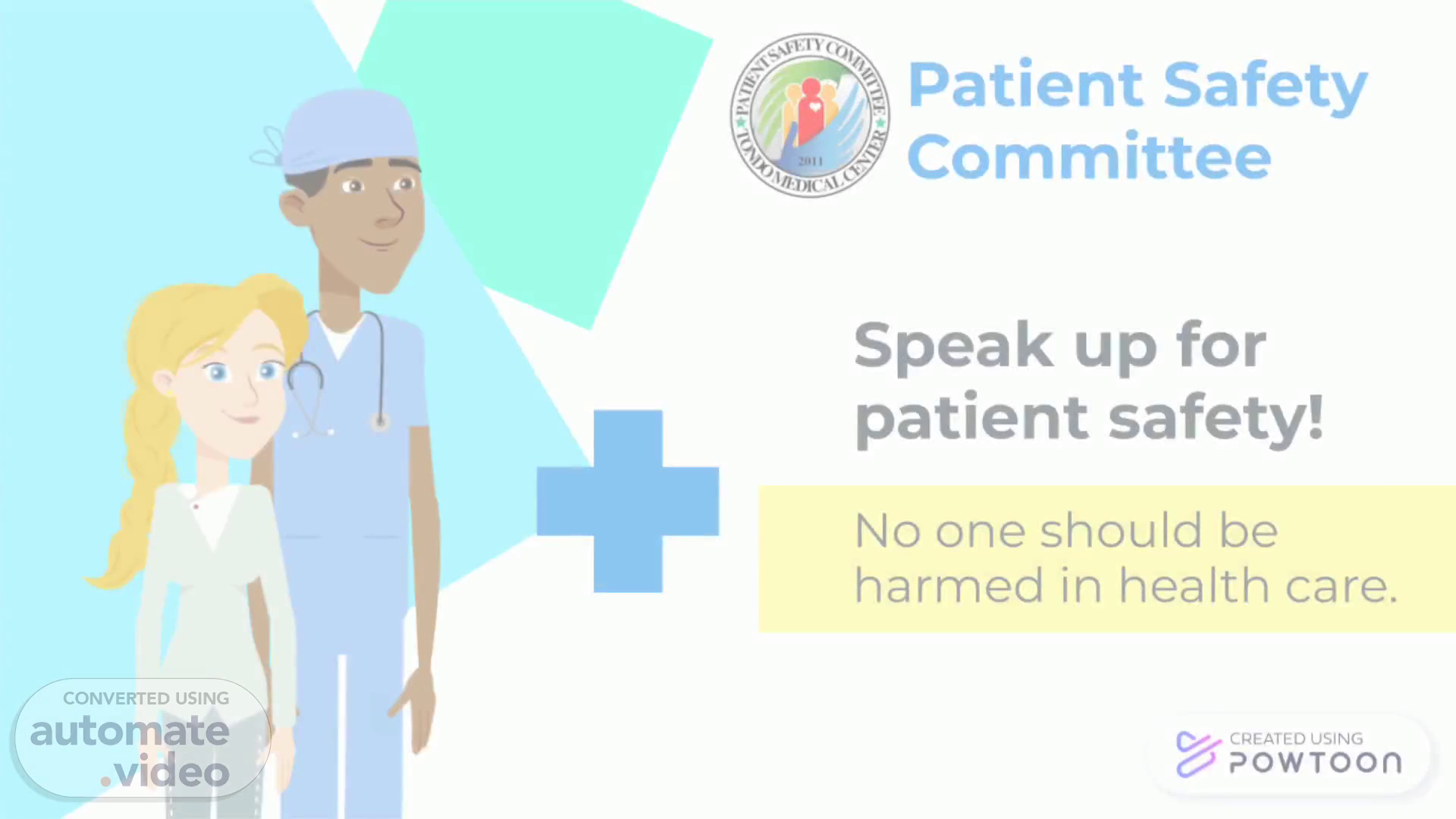Scene 1 (0s)
[Audio] Patient Safety Committee Speak up for patient safety No one should be harmed in health care..
Scene 2 (9s)
[Audio] Patient safety It aims to prevent and reduce risks, errors and harm that occur to patients during provision of healthcare. Patient safety situations causing most concern: Medication errors; unsafe transfusion practices Diagnostic errors Healthcare associated infections Sepsis Unsafe surgical care procedures Fall Safety hazards Communication errors Defective devices.
Scene 3 (48s)
[Audio] Resolution World Health Assembly (W H A) 72.6 on Patient Safety Patient Safety as a global health priority To promote patient safety by increasing public awareness and engagement, enhancing global understanding and working towards global solidarity and action (Patient Safety, 2019). Here is the 6 step in implementing Patient Safety Culture in Tondo Medical Center.
Scene 4 (1m 16s)
[Audio] step 1 BUILD A SAFETY CULTURE All staff should be included in the safety and health program, given the training and tools to recognize good and bad safety practices, and feel comfortable advocating for their own safety and the safety of others around them..
Scene 5 (1m 34s)
[Audio] step 2 LEAD AND SUPPORT YOUR STAFF Inspire staff by staying positive and filter out stress and negativity..
Scene 6 (1m 46s)
[Audio] step 3 INTEGRATE YOUR RISK MANAGEMENT ACTIVITY Integrated risk management gives organization a better understanding of their risks and help support informed risk- based decision- making..
Scene 7 (2m 1s)
[Audio] step 4 PROMOTE REPORTING Spotting safety hazards shouldn't have repercussions. Make it clear that there are no consequences to reporting incidents and hazards..
Scene 8 (2m 16s)
[Audio] step 5 INVOLVE AND COMMUNICATE WITH PATIENTS AND THE PUBLIC Recognize the importance of patient's active involvement in their own care..
Scene 9 (2m 28s)
[Audio] step 6 LEARN AND SHARE SAFETY LESSONS The 'root cause analysis' approach provides the healthcare staff with a consistent and structured methodology to investigate incidents. It enables staff to identify where systems are failing and where improvements in patient care and safety can be made..
Scene 10 (2m 51s)
[Audio] And MOST IMPORTANTLY.... And MOST IMPORTANTLY... POWTOOn CREATED USING 4 POWTOOn.
Scene 11 (2m 57s)
[Audio] step 7 IMPLEMENT SOLUTIONS TO PREVENT HARM It is important to properly train the staff and establish strict hospital protocols. From sanitation practices and medical record- keeping, , to medication administration and patient diagnosis, getting these things is all part of patient safety..
Scene 12 (3m 18s)
[Audio] How do you answer the CORRECTIVE ACTION REPORT? Conducting a Root Cause Analysis (RCA)is an essential problem- solving method use to isolate and identify concerns. Root Cause: State why did the findings occur. Tick the method that you will use, it can be thru: 5 Whys; Fishbone Analysis; or Brainstorming (Narrative) Root cause of the problem: Tick the nature of the problem, is it: Manpower; Money; Material/ Supply; Management; methods; Machine; or Mother Nature Corrective Action: Recommend preventive measures to ensure that the problem won't happen again. Responsibility: Staff member and Department heads Target date of Completion: Completion date of the initial implementation of all action.
Scene 13 (4m 29s)
[Audio] If you observed any Patient Safety Incidents... Refer immediately to the Physician, call the Supervisor- on duty and the Senior House Officer or inform directly the Patient Safety Nurse..
Scene 14 (4m 43s)
[Audio] Awareness is the key to prevention Do your work with pride, put safety in every stride. The Patient Safety Committee thanks all of you for all the dedication you bring to your profession everyday. We appreciate all the hard work you put in to keeping our institution safe and secure. God bless us all!.
